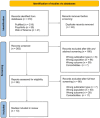Effects of therapeutic alliance on patients with major depressive disorder: a literature review
- PMID: 39830839
- PMCID: PMC11739292
- DOI: 10.3389/fpsyg.2024.1465017
Effects of therapeutic alliance on patients with major depressive disorder: a literature review
Abstract
Therapeutic alliance refers to the collaborative relationship between a therapist and a patient, a concept widely explored in clinical research. It has emerged as a crucial component of effective psychotherapeutic interventions, particularly in the treatment of major depressive disorder (MDD), where its role appears to be multifaceted. In this context, we reviewed the main literature on the role of therapeutic alliance in MDD. The record search was conducted across three databases: PubMed, Web of Science, and PsychInfo. Seven of the reviewed studies highlighted that therapeutic alliance is a strong predictor of clinical outcomes, contributing to symptom improvement, relapse prevention, and more adaptive functioning in patients with MDD. However, three studies supported the hypothesis that clinical improvement itself might influence the therapeutic alliance between a therapist and a patient at different stages of treatment. Overall, the results suggest a bidirectional relationship between therapeutic alliance and symptom improvement, indicating that a stronger alliance often predicts better outcomes and symptom reduction can further enhance the alliance. However, the interpretation of these results must consider certain methodological limitations. These include the use of different approaches, measurements, and clinical outcomes to assess therapeutic alliance, as well as insufficient exploration of the temporal precedence between therapeutic alliance and clinical outcomes. In conclusion, future studies are warranted to address these limitations and further clarify the role of therapeutic alliance in MDD, along with its potential implications for clinical practice.
Keywords: clinical psychology; clinical setting; interaction; major depressive disorder; therapeutic alliance.
Copyright © 2025 Videtta, Busilacchi, Bartoccioni, Cirella, Barone and Delvecchio.
Conflict of interest statement
The authors declare that the research was conducted in the absence of any commercial or financial relationships that could be construed as a potential conflict of interest. The handing editor CP declared a past co authorship with the author GD.
Figures
Similar articles
-
Therapeutic alliance mediates the association between personality and treatment outcome in patients with major depressive disorder.J Affect Disord. 2016 Sep 1;201:137-44. doi: 10.1016/j.jad.2016.05.016. Epub 2016 May 16. J Affect Disord. 2016. PMID: 27219531 Clinical Trial.
-
In-session interactive dynamics of the psychotherapy process between therapeutic alliance, therapist expertise, therapist technical intervention, patient metacognition and functioning.Clin Psychol Psychother. 2020 Nov;27(6):902-914. doi: 10.1002/cpp.2478. Epub 2020 Jun 4. Clin Psychol Psychother. 2020. PMID: 32436249
-
The Use of Text Messaging as an Adjunct to Internet-Based Cognitive Behavioral Therapy for Major Depressive Disorder in Youth: Secondary Analysis.JMIR Form Res. 2024 May 31;8:e40275. doi: 10.2196/40275. JMIR Form Res. 2024. PMID: 38820586 Free PMC article.
-
A collaborative approach to the treatment alliance in bipolar disorder.Bipolar Disord. 2004 Dec;6(6):504-18. doi: 10.1111/j.1399-5618.2004.00154.x. Bipolar Disord. 2004. PMID: 15541066 Review.
-
The impact of early remission on disease trajectory and patient outcomes in major depression disorder (MDD): A targeted literature review and microsimulation modeling approach based on the Sequenced Treatment Alternatives to Relieve Depression (STAR*D) study.J Affect Disord. 2023 Mar 15;325:264-272. doi: 10.1016/j.jad.2022.12.147. Epub 2023 Jan 4. J Affect Disord. 2023. PMID: 36608852 Review.
Cited by
-
Exploring psychotherapists' experiences in delivering effective treatment for major depression in Saudi Arabia: a qualitative study.Sci Rep. 2025 Jul 16;15(1):25862. doi: 10.1038/s41598-025-11293-3. Sci Rep. 2025. PMID: 40670525 Free PMC article.
References
-
- Alexander L. B., Luborsky L. (1987). “The Penn helping Alliance scales” in The psychotherapeutic process: A research handbook. eds. Greenberg L. S., Pinsof W. M. (New York, NY: Guilford; ), 325–356.
-
- American Psychiatric Association (2013). Diagnostic and Statistical Manual of Mental Disorders: DSM-5, Vol. 5. Washington, DC: American Psychiatric Association.
-
- Beck A. T., Rush A., Shaw B., Emery G. (1979). Cognitive therapy of depression. New York: Guilford Press.


